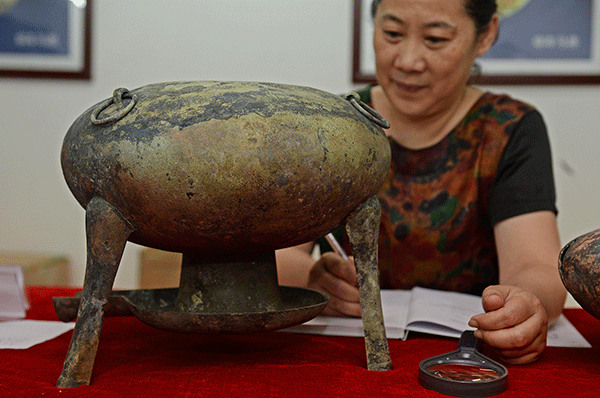
A three-legged bronze, unearthed in the 2,000-year-old tomb of Haihunhou in Nanchang, Jiangxi province, may be a hot pot.(Wan Xiang/Xinhua)
A bronze pot containing chestnuts, unearthed in a 2,000-year-old tomb may prove the popularity of hot pot cuisine among ancient aristocrats.
The three-legged vessel was found in the tomb of Haihunhou, the Marquis of Haihun, and dates back to the Western Han Dynasty (206 BC - AD 24).
It was identified as a hot pot because a charcoal plate was attached to the bottom that could keep broth simmering while being served, said Zhang Zhongli of the excavation team at the Haihunhou burial ground in Jiangxi province.
Charcoal traces and food residue, including the chestnuts, indicate the vessel had been used before it was buried.
"It is very likely that the tomb's owner was a hot pot lover, so he had his pot buried with him," Zhang said.
It was tradition in ancient China for treasures and favored items to be buried with the deceased. Also found in the tomb were gold, jewels and two chariots.
Though hot pot dinners are popular in modern China, they were rarely seen on the dinner tables of commoners 2,000 years ago. Such containers were only found in tombs of the nobles, Zhang said.
Yet some researchers have questioned the utensil's real use. Hu Dongbo, also part of the team, said the plate could not hold sufficient fuel for boiling and might actually have served to keep food from cooling down.
Experts are now collecting food residue in the vessel for further tests, Zhang said.
The Haihunhou cemetery covers roughly 40,000 square meters and contains eight tombs and a chariot burial site. It is the most complete Western Han Dynasty cemetery ever discovered in China.
It is thought its main tomb belonged to Liu He, grandson of Emperor Wu, whose reign ushered in one of the most prosperous periods in China's history.
Liu was given the title "Haihunhou" after he was deposed as emperor after only 27 days, dethroned by the royal clan which felt he lacked talent and morals. Haihun is the ancient name of a very small kingdom in northern Jiangxi.


















































